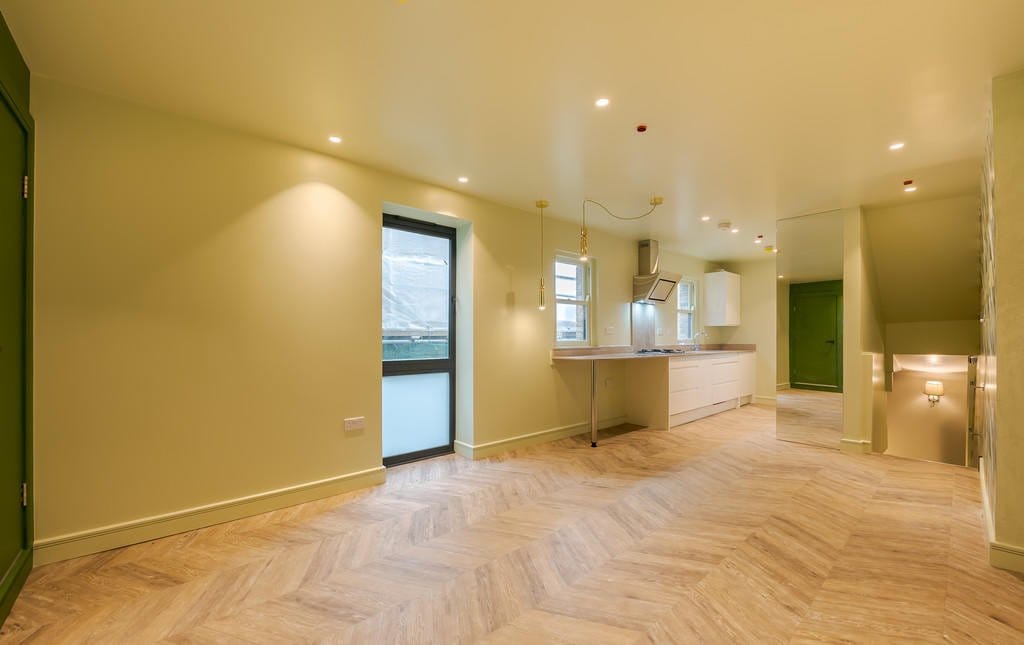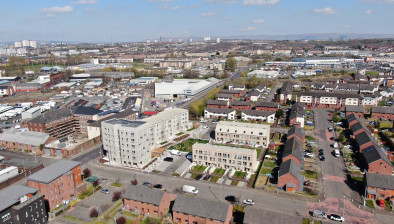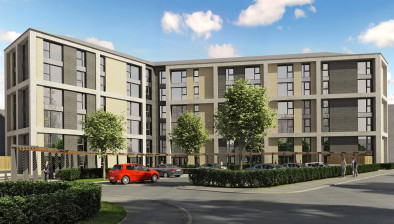WSHA unveils ‘infrared’ wallpaper heating trials

The ‘infrared’ wallpaper system in place
West of Scotland Housing Association (WSHA) is continuing its efforts to explore innovative and effective solutions for heating tenants’ homes with promising first trials of innovative ‘infrared’ wallpaper.
In the early months of 2024, WSHA became the first housing association in Scotland to begin trialling the technology – described as an innovative, clean energy solution to rising heating costs and a possible alternative to air source or ground source heat pumps.
The NexGen electric wallpaper is 4mm thick including a layer of Graphene which emits infrared waves when powered by electricity. Applied in strips to ceilings throughout a property, when powered the wallpaper heats a room from the top downwards, warming the residents and the surfaces of the home rather than heating the air like traditional heating systems. The resultant heat feels like gentle sunlight. Temperature is managed by the resident via an app or simple-to-use thermostatic controls.
This efficiency of this system is hoped to have a positive impact on household running costs, translating into savings for tenants, as well as affecting a reduction in tenants’ overall energy use. Evidence from WSHA’s monitoring thus far has shown that once a property reaches the desired temperature, heat is retained within the fabric of the property for a significant period after the heating itself has been switched off. This means the property cools down slowly and feels warmer for longer.
The wallpaper is also nearly invisible once installed, eliminating bulky radiators and boilers, making better use of the space in tenants’ homes. The only sign the system is installed will be the thermostat.
Ms Catherine Henderson, a WSHA tenant who had the system installed in February this year, said: “It’s been absolutely fantastic, it heats up really fast compared to the other heating. I usually only have to put it on for a couple of hours in the morning and that does me all day. It’s never cold in here now. Before my heating was on 24 hours a day.”
WSHA’s director of development, Andrew Kubski, said of the ongoing trials: “WSHA are constantly looking for efficient solutions that have positive impacts for our tenants. We have had really encouraging early indicators from NexGen’s system, one of our partners in these pilots, supported by extremely positive feedback from residents. We have installed this product in two different archetypes and are monitoring the impact on usage by residents. Like with all new technology, we are working with tenants to get the best out of the system, learning as we go. We hope this technology will be a significant step towards our net zero ambitions.”
In this trial stage, WSHA has fitted infra-red wallpaper into 10 properties in Kirkfieldbank, South Lanarkshire, all mid-century terraced homes and in 10 tenemental properties in Springburn, Glasgow. The first usage data will be available in summer 2024 and testing will continue for the rest of the year, measuring performance of the system across seasons.
WSHA is committed to embedding sustainability across its business model. The trialling of NexGen is the latest innovation from the Association, who in 2023 broke new ground
by completing the largest affordable Passivhaus development in Scotland at the time, with 36 socially-rented flats in Springfield Cross, Glasgow constructed to this highly energy-efficient standard. Last week, this was followed by the launch of a further 90 Passivhaus standard properties at Dundashill, Glasgow with an additional 66 in the pipeline.
Other initiatives have included a £5.7 million upgrade to conservation-area properties in Charing Cross, Glasgow, replacing single-glazed windows with specialist sash-and-case
style double-glazing, hugely reducing energy loss in these properties; encouraging bike use by tenants by installing additional bike storage in communities; installing solar panels at the Association’s Camlachie offices and purchasing electric pool cars to encourage car-sharing between WSHA employees. Further opportunities are constantly being explored as WSHA continues to work proactively towards halving the organisation’s Scope 1 and 2 carbon emissions by 2030.























